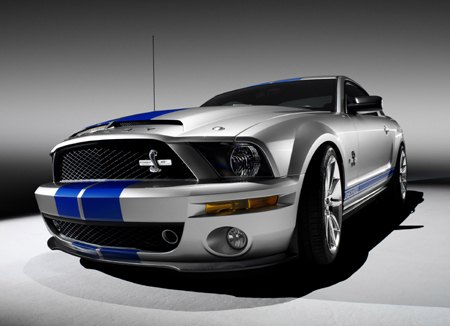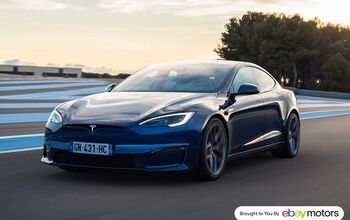Ford Death Watch 29: Funkmaster Flex Expedition? Shelby GT-500KR? Ford F-150 Foose Edition? Pimp My Nothing
"We are absolutely going to do what it takes to keep our product fresh and keep it relevant in the market.” Now THAT’S what I’m talking about! A Ford exec making a public commitment to ongoing excellence. No more cut and run. No more vehicles dying on the vine or losing out to some new “flavor of the month.” Oh wait. Ford's truck marketing manager wasn’t talking about keeping it real for the core models. Ben Poore was celebrating the company’s decision to offer a Chip Foose edition F-150. Oh dear.
I’m all for “mass customization.” The MINI and Scion brands nailed it: encourage buyers to give a nice car enough individuality to make it their own– without destroying resale value. But these are niche brands. While the same principle may someday apply to mass market automobiles, most of today’s buyers still frequent dealers with hundreds of roughly similar vehicles waiting for a new home.
And that means that Ford’s big push for “limited editions,” its newfound faith in so-called “microsegmentation,” is yet more evidence that Ford’s fundamentals are broken. The Chip Foose Edition F-150 (450-horsepower 5.8-liter V-8 and Overhaulin’ stylin’), the Shelby GT-500KR (yet more horses for an overpowered death car) and the Funkmaster Expedition (Why not the Funkmaster Flex Flex?). All of these vehicles will do precisely nothing for the sales of the brand’s core products.
I know. They’re fun! They’re exciting! They create “the kind of buzz in the marketplace that keeps companies healthy." Anyway, that’s Ben Poore’s theory. And a plenty popular one it is too; at least amongst the people who really love muscle modded mainstream motors. As far as hard-nosed beancounters are concerned, it’s a less well established principle.
In 2000, Ford flogged some 200K Mustangs. The next year, they offered the 265hp 4.6-liter Bullitt edition. One year and 5582 Bullitts later, ‘Stang sales sank to 155K. In ’03, FoMoCo launched the 305hp 4.6-liter Mach 1. The company sold 9600 of those bad boys. The next year, Mach 1 sales slipped towards subsonic, dropping to 7100 units. Overall ‘Stang sales slid to around 140k units. In short, the hard core variants either cannibalized Mustang sales or did sweet FA to stop the rot.
Ah, but what of the so-called halo effect? Like many testosterone-crazed auto execs, Poore was implying that way cool Mustangs, F-150’s and Flexible Flyers will create warm fuzzies for the models’ more pedestrian stable mates, or the Ford brand in general, or something. It’s strange to see this trickle down branding concept re-emerge from the Glass House Gang– given that the automaker recently deep-sixed their entire SVT tuning division and pulled the plug on the world class Ford GT supercar.
And fair enough. As we’ve argued before, halo cars are a waste of time and energy that reveal company-killing ADD (Studebaker Avanti anyone?). Sure, Ford’s fire-breathing mutants make US happy. But we’re pistonheads. We love the extreme, the amazing and the unique (ish). Let’s face it: the vast majority of the American car buying public couldn’t care less about a 450-horse pickup truck, or any other wild-ass vehicle. They want vanilla. Plain, old, vanilla.
So never mind all the marketing gobbledygook about intangibles like a special model’s effect on “brand positioning.” At the sharp end, special editions are nothing more than a way to earn the dealer a little extra cash, or provide dealer drive-by props, or give the sales manager a cool car to drive instead of the plain Jane sedan he beats to an inch of its life. Again, you gotta wonder, why bother?
Never underestimate the impact of corporate culture on a company’s priorities. Toyota is on a mass market mission. Does ToMoCo have a halo car? No. Ford is… confused. Their culture is no longer about doing the hard work needed to endlessly improve and promote core vehicles like the Crown Victoria, Escape, Explorer or Freestyle. It’s all about finding a Hail Mary pass that suddenly saves the company from ruin.
High-priced limited edition vehicles are not going to save Ford. They’re not even going to help them. Truth be told, this showboat-load of special edition models only exist because they give Ford’s dispirited marketing and PR folk something “interesting” to do. What’s the bet Ford will provide DOZENS of high quality press pictures of the Shelby ‘Stang— while they remain oblivious to the fact they can’t provide one decent shot of the Focus. Or, for that matter, a decent Focus. Or, quite simply, maintain focus.
Again, don’t get me wrong. I celebrate automotive diversity in all its forms. But someone’s got to remind Ford that their brand isn’t about diversity, or horsepower, or Funkmaster Flex’ fanatical followers, or anything else that smacks of spizzarkle. Ford is about value for money. Period.
More by Robert Farago
Latest Car Reviews
Read moreLatest Product Reviews
Read moreRecent Comments
- 28-Cars-Later One of the biggest reasons not to purchase an EV that I hear is...that they just all around suck for almost every use case imaginable.
- Theflyersfan A cheaper EV is likely to have a smaller battery (think Mazda MX-30 and Mitsubishi iMEV), so that makes it less useful for some buyers. Personally, my charging can only take place at work or at a four-charger station at the end of my street in a public lot, so that's a crapshoot. If a cheaper EV was able to capture what it seems like a lot of buyers want - sub-40K, 300+ mile range, up to 80% charging in 20-30 minutes (tops) - then they can possibly be added to some lists. But then the issues of depreciation and resale value come into play if someone wants to keep the car for a while. But since this question is asking person by person, if I had room for a second car to be garaged (off of the street), I would consider an EV for a second car and keep my current one as a weekend toy. But I can't do a 50K+ EV as a primary car with my uncertain charging infrastructure by me, road trips, and as a second car, the higher insurance rates and county taxes. Not yet at least. A plug in hybrid however is perfect.
- 28-Cars-Later Neither, but Honda lost the plot a while back in my view so Rav it would be.
- Kwik_Shift_Pro4X Nope. Still not interested.
- 28-Cars-Later I know someone who would snap this up for the right money, but Ontario and likely the ask would prohibit it.


































Comments
Join the conversation
As my final positive thought on this issue. Wouldn't it be nice if ford's special edition cars and trucks were especially fuel efficient. Be they clean diesels, hybrids, or whatever, a way to get 20% better fuel economy instead of 20%worse. then the same big spenders could step up and say I have the largest vehicle (f150) sold in the US that gets 20+mpg. Now that would be refreshing.
Ford is doing what it has always done. When it has dealer lots full of unsold cars by the acre, and more new ones rolling out the factory door every day, then you have to come up with a gimmick to pull people into the showrooms. Ford, of course, wants to do this without spending a dime in development. Bingo: slap on the plastic and the go-fast paint, whip out the snake/horse stickers, and all hail the latest retro flashback. Lipstick on a pig, Ford. We all know it's just more lipstick on the same old pig...